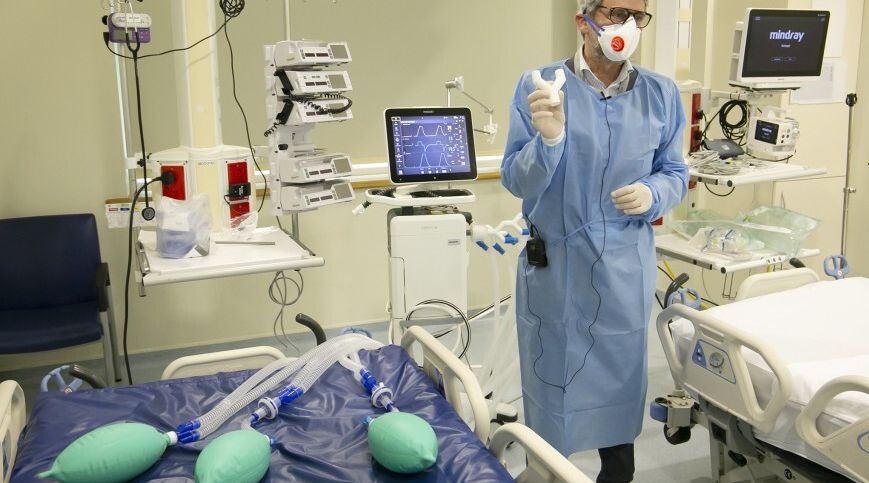The Higher Colleges of Technology succeeded in creating a high-quality 3D Printed Ventilator Splitter for treating multiple patients with a single ventilator in hospitals’ Intensive Care Units. With this innovation, HCT joins in the fight against COVID-19 with a 7-person team of experts to provide the product in the UAE as a creative and effective solution that helps meet the demands of the health sector during emergencies.
The HCT team, which created the splitter, is comprised of Nicola Bettio, HCT Executive Director of Applied Research, Innovation and Entrepreneurship, Dr Nezam Al Nsair, Executive Dean, Faculty of Health Sciences, Dr Saud Aldajah, Executive Dean of Engineering Technology and Science, Dr Saleh Ahmad, Engineering Technology and Science faculty member, Tiago Caldeira, Jorge Montalvon and Solomon Embrafrash from InnCuVation Spaces
Dr. Abdullatif AlShamsi, HCT President & CEO, said the role of the Higher Colleges of Technology is not limited to providing educational services, but also extends to providing support to society and contributing effective solutions that meet the real needs of the various industry sectors, especially in exceptional circumstances, such as the present pandemic. “The HCT InnCuVation Spaces have embodied this key role, through the design and fabrication of a 3D medical-grade splitter which enables hospitals to use a single ventilator to treat multiple patients simultaneously,” Dr Al Shamsi said.
Mr. Nicola Bettio, HCT Executive Director of Applied Research, Innovation and Entrepreneurship, said that HCT’s active research and innovation environment, facilitated by the InnCuVation Spaces’ resources and capabilities, was a catalyst to design the ventilator splitter.
“There is an increased awareness in the UAE and worldwide of the risks associated with the COVID-19 pandemic, and it is the responsibility of every citizen to confront this pandemic. Being one of the largest applied higher education institutions, the HCT is empowered by its resources and staff to provide effective solutions to support the UAE’s efforts in confronting any challenges posed by the pandemic,” he said.
The splitter prototype was designed in the HCT’s state-of-the-art “InnCuVation Spaces”. These centers have been set up to develop, incubate and commercialize innovative concepts and products, for UAE industry and society, using advanced technologies, including the latest 3D printing techniques.
Praising this remarkable proactive accomplishment, Dr Al Shamsi added that following initial tests of the device, discussions are underway with medical authorities to distribute the splitter. Following directives of the HCT Board of Trustees, HCT will provide free access to the technical information related to the fabrication of the splitter to enable its large scale production in coordination with the UAE’s regulatory authorities, for the benefit of society in general.
“3D printing technology allows for rapid prototyping and production of pre-industrial batches of final products and we realized that few designs for ventilator splitters have been developed by universities around the world. We felt that we also needed to give our contribution and we loved the challenge. We wanted to have a solution available in the UAE, so we gave ourselves a few days to design and prototype a medical-grade product, and make sure that it was manufacturable in large quantities.” Mr. Bettio added.
Mr. Bettio said the HCT team worked around the clock for 10 consecutive days to design and fabricated several prototypes, using different methodologies. Utilizing a state-of-the-art 3D printing technology they were able to design the prototypes in a short time frame and conduct initial tests in order to produce the ideal splitter, which is adaptable to ventilators mostly used in the UAE. Up to 1,000 units can now be produced weekly, upon the approval of the UAE’s regulatory healthcare authorities.
WAM
 AR
AR UR
UR
